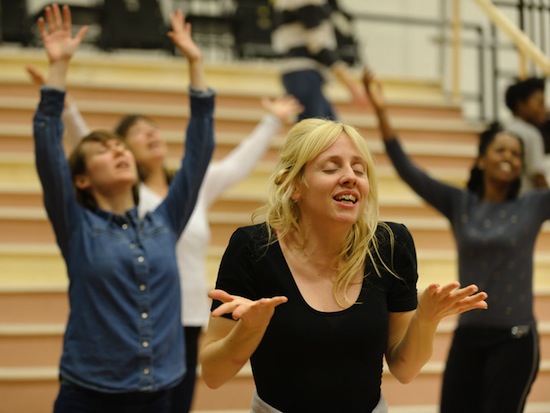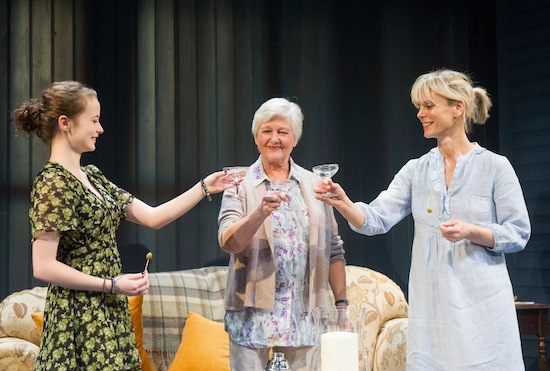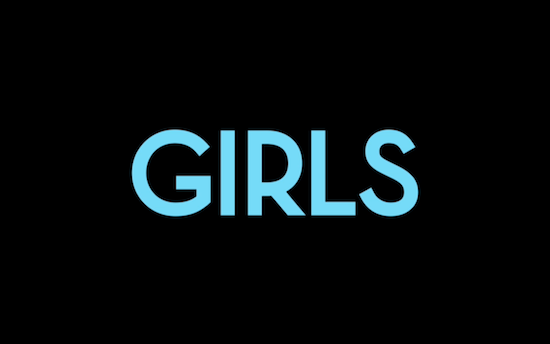The feminist movement is in rude health. Online movements such as Everyday Sexism and No More Page 3 have become part of a daily conversation. Lena Dunham’s continually-divisive Girls has changed the way women appear on television, and Jennifer Lawrence has become one of Hollywood’s biggest stars, whilst refusing to conform to stick insect-esque body expectations. For one day last year, Channel 4 stopped transmitting programmes about unsightly warts, unconventional people looking for dates, and vulnerable members of the welfare state, and aired The Cruel Cut, a film by Leyla Hussein about FGM. We’ve been promised that Jane Austen will soon be adorning our ten pounds notes, and Bridget Christie won the Edinburgh Best Comedy Show Award for her feminist stand up, A Bic For Her.
However, if you look to the multiplexes, challenging parts for women remain few and far between, and you’d be forgiven for thinking female parts in films were something more like the proverbial glacier cherries.
The theatre is guilty too. The National Theatre’s ‘Fifty Years On Stage’ anniversary gala served as a reminder of how female playwrights have been long neglected, with Alecky Blythe the only woman to have her work performed in a two-and-a-half hour retrospective of the institution’s history. Lucy Kerbel was compelled to write 100 Great Plays For Women after becoming frustrated by the comparative lack of representation female characters (and therefore female actresses) receive on stage.
Cheeringly, there are signs of a positive sea change. There are currently two plays at major London theatres that take feminism as their subject: Blurred Lines at the National, and Rapture, Blister, Burn at the Hampstead Theatre. A further confidence bolsterer is that both plays boast sold-out runs, with their audiences diverse in gender as well as age. Feminism is working its way up our cultural and political agenda thanks to an increasingly engaged and receptive public, and it is genuinely stirring to see both of these projects on stage at the same time, their entrances adorned with ‘HOUSE FULL’ notices.
Both plays address different areas (Blurred Lines focuses on cultural prejudice, Rapture, Blister, Burn on structural inequality) in different ways (a devised piece and a domestic comedy respectively). However, as an exercise in portraying women intelligently, empowering the audience, and acting as a catalyst for the discussion of difficult questions, their success is varied.
Devised in the rehearsal room by the uniformly excellent all-female cast of eight, the director Carrie Cracknell and the writer Nick Payne, Blurred Lines unfortunately seems less than the sum of its parts. It promises a ‘blistering journey through contemporary gender politics’, and Cracknell and Payne have stated that Kat Banyard’s 2010 book The Equality Illusion was the inspiration for the production, as well as a heavily drawn-on source throughout its conception. It is a book that combines the touching stories of real women with hard statistics that shock (domestic violence causes more death and disability to women between the ages of 16 and 44 than cancer or traffic accidents).
The play opens with the cast reeling off a list of tired casting clichés, clearly with some relish. There is humour in some, pain in others: "Brittle first wife", "Prostitute, black", "Bubbly northern blonde", "Receptionist", "Woman with character face". On a stage comprised of a giant set of white Perspex stairs, the cast march up and down with veritable unease, spread in postures of discomfort. This demonstration of the sexist limitations in female casting becomes a self-fulfilling prophecy, however, when it reaches its crescendo: the women list off a variety of characters bookended with the word ‘victim’ ("rape victim", "victim of violence", "victim of war"). As they recite clichéd lines from scripts ("if you’d like to follow me, please" "He’s in a meeting at the moment I’m afraid"), these become peppered with cries for help, "stop", "please". This uncomfortable insistence on portraying women as vulnerable, preyed-upon subjects of violence unfortunately sets the tone for the rest of the play. We might be living through mighty, mighty fourth-wave feminism where women shout back, but Blurred Lines offers an anachronistic display of disempowerment and silent victimhood.
Women’s stories are told through sketch format: we have a woman who has returned from maternity leave and is being hounded by her boss for having baby sick on her back, a wife who wants her husband to explain his use of prostitutes, and a girl who has been raped by her boyfriend. Some of the language is poetic, but in the main these vignettes are performed casually with a microphone, which unfortunately gives the air of a sleazy stand-up comedian in the basement of a dingy bar.

These sketches are separated by musical interludes, and the cast sing ‘Do What You Want With My Body’ and ‘Don’t Liberate Me’ as sardonically as possible – and it is funny to look at the blatant sexism of the music industry, especially when performed with such knowingness by a group of intelligent and confident actresses. The songs are startling when put in the context of a play like this, but what’s more startling is watching an usher tap his feet and the girl next to me sing along obediently to the carefully-selected misogynist playlist that precedes the performance. These casual behaviours demonstrate a subconscious complicity with a violently sexist culture that is often so subtle it barely registers.
The trouble is, I wanted – and the subject matter undoubtedly deserved – something more difficult and more complex; something that acknowledges that the deathly march of sexual discrimination is often upheld by a misogyny that is insidious through its ability to go widely unnoticed.
There is comedy early on when an actress is filming a scene where she is attacked late at night. We see the director’s demands become more and more ridiculous – she is asked to wear less clothes, to wear higher heels. We fight to walk the streets safely wearing what we like at Reclaim the Night marches, but Ariel Levy’s Female Chauvinist Pigs also put in a convincing argument for women reinforcing their own oppression when they don’t wear many clothes. How do we manage to wear whatever the hell we want without being made victims of sexual harassment if we happen to want to dress like porn stars, whose purpose is to sexually gratify men? Now: there’s a difficult question to answer.
Again, there is a sharply-observed scene at the end that imitates one of the National Theatre’s Platform talks; a director is asked why he chose to dress his actress in underwear during one scene. The actress defensively replies, "You don’t understand the process," but by the end she has walked abruptly off stage, implying that she is rejecting the director’s attempt to objectify her. Perhaps similarly, Cate Blanchett was recently accused of biting the hand that feeds when she called out a cameraman that filmed up her body. But, Blanchett did call him out. She didn’t walk away and shut down dialogue.
What has the potential to demonstrate the scope and success of contemporary feminism instead left me grasping as to what it was trying to say. What about FGM? The niquaab? The lack of women in leadership positions? A national press riddled with sexism? Bizarrely, a couple of the cast were on their phones during the performance, but this seemed to be due to a deficiency in line-learning rather than an oblique reference to the sexually abusive Twitter threats sent last year to Caroline Criado-Perez, Stella Creasy and basically every working female columnist in the UK.
Theatre is about starting a conversation, sure – but this conversation has already started, and is moving at lightning pace. Robin Thicke is an easy target and the show is a sell-out. A member of the cast announces with some glee that they were refused permission to sing ‘Blurred Lines’ in the show – but what would even be the point of that? To act out our own subordination? In fact, isn’t that basically what the entire play seems to be doing? I’m not sure how that is useful, or what it achieves. There are many difficult questions in feminism, but none of them have been asked here.

One review of Gina Gionfriddo’s Rapture, Blister, Burn contains the following sentence: "If you’ve been dragged here and feminism just ain’t your thing don’t worry, though, Emilia Fox appears wearing only heels and sexy underwear in the second half, so there’s something for everyone." If you don’t believe in the equality of both genders, NEVER FEAR: you can ogle a woman’s breasts and continue being a human dam to the river of progress! And in one sentence, the case for feminism was proven.
This production differs entirely from Cracknell and Payne’s work in that it boldly and unapologetically asks a number of uncomfortable questions about contemporary life for women: most predominantly "Can women have it all?" Does Gionfriddo go some way to answering this question? I think she does.
Catherine (Emilia Fox) is an attractive feminist academic whose life has focused on the pursuit of her career. Her friend Gwen (Emma Fielding), on the other hand, left college early, married Don (Adam James) and had a family. The three knew each other at college: Don and Catherine were a couple, but when she left for London for her work, Gwen made her move. Catherine has moved back in with her mother, Alice (Polly Adams), who she believes is dying, and the three now find themselves back together after over a decade apart.
There is, of course, palpable tension in the air from the start; Gwen displays a fawnish admiration of Catherine that the latter clearly finds uncomfortable. It is revealed that Gwen has given up drinking, whilst Don drinks too much – "Drinking and failure," apparently, "are all he’s ever achieved". (In fact, it transpires that Don spends much of his time in following the noble pursuits of watching porn and getting stoned.) The couple’s marriage is cracked with bitterness and their relationship with their children is fragmented. But Catherine, too, is unfulfilled. Having worked hard on her career, we learn that she now spends nights drunk and picking up younger men in bars. Both of the women yearn for what the other has, but both are afraid that they are too old to change their lives.
Catherine decides to run a summer school in her house on feminist theory, and when the students show up they coincidentally turn out to be Gwen and the family babysitter, Avery (Shannon Tarbet), a 21-year-old making a reality TV show with a seemingly-exploitative boyfriend. A seminar on feminist theory doesn’t exactly sound like a scenario with much scope for dramatic tension, but as a battleground for the polarised perspectives of different women it is fascinating.
There is a poignancy in Gwen’s desire to learn – more so when we see her wounded by how the life she has made seems to fly directly in the face of the feminist concepts she is so eager to learn about. Avery, on the other hand, admits that she would not call herself a feminist: for a younger woman, as yet unaware that she is up to her eyeballs in a pervasive and sexist world of media and consumerism, there doesn’t seem to be any need for it.
One of Gionfriddo’s boldest moves is to engage with an overtly anti-feminist woman, Phyllis Schlafly. Having campaigned against the Equal Rights Amendment in 1972, Schlafly believed that feminism was an attempt to restructure Human Nature, and a woman’s place was in the home. A real life quote from Schlafly: "Sexual harassment on the job is not a problem for virtuous women".
Catherine sets Schlafly up against Betty Friedan’s belief in "the silent question – ‘is this all?’". In Gwen we have a character who seems to have been at one with Schlafly’s line of thought throughout her life, until her close encounter with Catherine’s very different world. Catherine, on the other hand, has made a living on the very idea that what Schlafly believes is dated nonsense, and women can do whatever they want. These ideas are so out of vogue that Catherine thinks to realise them would be an act of rebellion, saying: "I’ve thought about being a stay-at-home mum, just as a fuck you to the system." So how now to explain her sense of urgency towards starting a family?

Catherine and Don take to staying out drinking all night whilst tee-total Gwen stays in the house with the children. At one point, observing the Don’s tendency to numb himself to his unsatisfactory life through drinking, Catherine asks, "Can’t you just try and make a life that’s happy so you don’t have to drink so much all the time?" Don’s reply is that Catherine would be the one to know how to make a happy life because she’s "living the dream". Catherine’s response is one of bewilderment – the way her life appears outwardly to others jars with her own sense of unhappiness. Catherine’s pain is clearly that she longs for the possibilities of an alternative life unlived. Through their own reminiscences, we discover that Catherine and Don’s relationship was more one of equals than Don’s current marriage: both felt fully stimulated. She wonders how her life would have turned out if she had sacrificed some of her career choices in order to stay with him; he is dazzled by this articulate and independent woman who has waltzed into his mundane life with her high heels and wry intelligence. Inevitably, they begin an affair.
The next – utterly implausible but dramatically fascinating – twist is that Gwen and Catherine decide to swap lives. Gwen going to New York and back to school, Catherine staying at home with Don and the children.
It feels vital that, in this feminist play, Gionfriddo makes the role of the man so central. Don is confused by the changing gender landscapes: it seems that he once felt threatened by Catherine’s intelligence and ambition, but now realises that life with her would have been better. Nonetheless, he quickly gets cold feet. Catherine tries to encourage him to get back into teaching, or to write a book – but he doesn’t want to. There is a complexity in the way that Don is in awe of Catherine but at the same time repelled by her ability to remind him of his own inadequacy that ultimately leads him to further self-sabotage. As Don begins to retreat, Catherine holds on tighter, and everything that marked her out as different begins to fade away. She loses her power as she takes Don’s apathy lying down, adjusting herself to accommodate it, saying "I can push myself but I have no right to push you," apologising for her own passion and conviction. At one point she even begs, "I am ready to embrace mediocrity and ambivalence!"
What Gionfriddo powerfully indicates is that even the most ardently-feminist of women can be brought to their knees in seeking affirmation from men. Further, Catherine is not judged for this: what we become aware of is that, in a world saturated by heteronormative images of a nuclear family – dysfunctional as they often clearly are – those who choose a different path can end up doubting their decisions.
Don and Gwen decide to reunite, and, with bitter predictability, Don faces no consequences for his infidelity with Catherine or his unwillingness to fulfil his true potential. But there is also a depressing sense that nothing will change for this family: they have envied Catherine’s life, but they have also realised how hard it is to live, and they retreat back into their life of indifference, afraid to do anything bolder.
Having decided to go back to New York, Catherine is bringing Avery with her: at this point, as she sits with her mother and the now-single Avery, she seems to understands that she does have a family of her own, without having to give anything up. The choice to be unconventional, brave and difficult, is the only way to be fulfilled. They end with a toast, and Catherine’s mother boldly says, "To Phyllis Schlafely."
"She said you girls would pay for your independence and your whoring," she continues. "She said men wouldn’t stay with you and she was right. You’re free."
It was Nina Power that wrote, "It is easier to imagine the end of the world than the death of the nuclear family," and this gets to the heart of Gionfriddo’s message. When we escape the conventions and institutions that we have long outgrown but continue to cling on to, we can find the life that we really want to live – not the life that advertising agencies and soap operas think we should prize. Rapture, Blister, Burn may not have the flashing lights and catchy songs of Blurred Lines, but it is far more radical: it bravely shows its audience a new way to be.
Blurred Lines and Rapture, Blister, Burn are currently running sold out shows in London, with day tickers for Blurred Lines and returns for Rapture, Blister, Burn available on the day of performance


